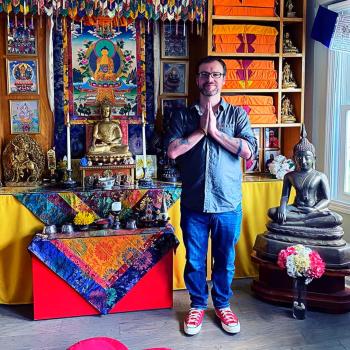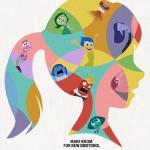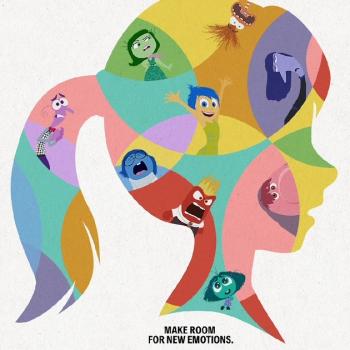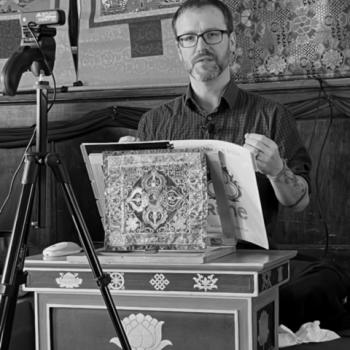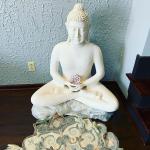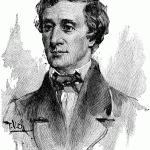The one we call the Buddha wanted to understand suffering and it’s causes. He tried indulging in all the worldly pleasures that he could and he didn’t find what he was looking for. He tried studying with some of the spiritual teachers of his day and he didn’t find what he was looking for. He tried extreme fasting and intentional discomfort and he didn’t find what he was looking for.
So he sat under a tree with the great resolve to figure it out for himself.

After some time, he had what we call an awakening. At first he thought he couldn’t effectively share this awakening with other people. He thought they couldn’t possibly understand. But he was motivated by compassion to try anyway.
The Buddha went and shared what he realized with a group of men we call the five ascetics. He told them the way to live our best lives is a Middle Way, something in between giving in to temptations all the time and denying ourselves all worldly pleasures. He said extremes are not good. He described what we normally call the Four Noble Truths:
1) Life is Suffering
2) The cause of suffering is attachment
3) There is a way out of suffering
4) The Noble Eightfold Path.
The first two describe our situation and the second two describe a way to do something about it. In his book ‘Buddhism Without Beliefs’ Stephen Batchelor reframes the Four Noble Truths. He calls them Ennobling Truths instead.
He describes them as: “anguish, its origin, its cessation, and the path leading to its cessation. Anguish, he says, is to be understood, its origins to be let go of, its cessation to be realized, and the path to be cultivated.”
Sometimes we tend to try to make this path into something different. The further we start to get away from suffering and the causes of suffering, the more we probably need to re-assess and ask ourselves, “Am I getting off track?”
Batchelor goes on to say, “In describing to the five ascetics what his awakening meant, he spoke of having discovered complete freedom of heart and mind from the compulsions of craving. He called such freedom the taste of the dharma.”
The truth is we cause a whole lot of our own suffering by being obsessed with ourselves and our desires. The killer is inside the house.
Buddhism describes actions to take (and avoid) rather than things to believe in. That’s an important thing to keep in mind too. We are used to being told what to believe in. This is a path of action. Buddhism is something you do. Sometimes we use the word ‘faith’ in Buddhism, but we don’t mean it in a religious sense. It’s the faith that comes from confidence and our own perception of how the path is helping us.
Our normal reaction to the vagaries of life is lamentation. We suffer and cry out, “Why is this happening to me?!” In my opinion a more productive way of moving through the world is to instead say, “Right now it’s like this. What can I do?”
This one time I discovered my car tire had a slow leak. After I put air in several times I knew I had to take it in somewhere. So I did. But while I was on my way to Discount Tire I started telling myself stories. I was thinking I would need a new tire. I was thinking they wouldn’t have my tire in stock, so I’d be without a car for a few days, I was thinking it would be really expensive. With these thoughts I was ruining my own afternoon.
And they patched my tire for free.
We are consumed by trivialities and eaten up by our struggles because we have this idea that we’ll avoid everything bad in life. When you combine this with how inattentive we are and how we sleepwalk through life, it’s a recipe for unhappiness.
Craving is that incessant wish we have for things to line up for us and resentment when things don’t. Whatever we want, we tend to want it right now. Things will never line up perfectly. That’s not how life is. Sometimes it feels like things are going really well for a while, then life suddenly kicks you in the face. Sometimes it seems like things are going badly for a long time too. This too shall pass, as they say. The richest man in the world was still unhappy enough to get divorced like the rest of us. We sometimes think that if we get all the things we want we’ll be happy. But that won’t work. Added to this craving is our obsession with ourselves. We can tend to think we’re the center of the universe and the only person that matters. We wouldn’t say it out loud, of course, but sometimes our actions show that we don’t see other people as people with needs, hopes, and desires…just like us. Everyone wants to avoid suffering and be happy.
We can let go of our craving and our self obsession and our emotional baggage. That’s what the Buddha encourages us to do. But it’s not something we achieve so much as a process we’re trying to embody. Awakening is a verb and not a destination. When we think it’s a destination we can create all new and different forms of craving.
I lived in an apartment and I had apartment problems. I had a landlord that wouldn’t fix my air conditioning and I had noisy neighbors. Then I bought a house and now I have house problems. I have an expensive mortgage, I had to buy a furnace, and I think I heard a woodpecker pecking on my wall. Whether they’re house problems or apartment problems, there are always problems.
We are training in virtue, mindfulness, and wisdom so we can learn how to put down the things that don’t serve us, see the world clearly, and cause less suffering for ourselves and others. Sometimes in Buddhism we talk about ‘saving all beings’ and I like to add ‘from myself’ because that’s what I have power to save people from…my delusion and selfishness. This is all a kind of radical and boundless authenticity. What would it look like if we were truly genuine?
Batchelor summarizes the four truths in the following way: “The actions that accompany the four truths describe the trajectory of dharma practice: understanding anguish leads to letting go of craving, which leads to realizing its cessation, which leads to cultivating the path. These are not four separate activities but four phases within the process of awakening itself. Understanding matures into letting go; letting go culminates in realization; realization impels cultivation.”
================================
If you want to read “Buddhism Without Beliefs” you can get it here:
https://www.penguinrandomhouse.com/books/348402/buddhism-without-beliefs-by-stephen-batchelor/


